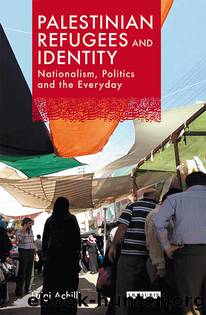Palestinian Refugees and Identity by Achilli Luigi

Author:Achilli, Luigi
Language: eng
Format: epub
ISBN: 9780857729040
Publisher: I.B. Tauris
Conclusion
Much can be inferred about the boundary between Islam and the political in al-Wihdat, especially its porosity in recent time, yet virtually nobody in the camp thinks there should be no boundary at all. The growing importance of Islam in al-Wihdat cannot be described as part of a broader trend of Islamic politics sweeping through the Middle East. Being Muslim in al-Wihdat is a more complex issue than refugees unthinkingly adhering to allegedly global forms of Islamic radicalism. The significance of Islam in the daily life of camp dwellers has not resulted in a straightforward militancy of camp dwellers in Islamic parties and movements. Refugees have been particularly critical of these groups, in which adherence to Islam and proper conduct among politicians and political parties are said to have given way to a cruder, more direct, and often embarrassingly shameless desire for power, office, money and recognition. By contrast, camp dwellers are much more concerned with the attempt to cultivate a moral self than with joining a militant Islamic group. But if Islam is interpreted by many as a project of ethical self-fashioning, it also provides refugees with the material for the reinterpretation of the cultural parameters of their world. Their efforts to keep Islam separate from the dangerous and dirty world of the political is not meant to suggest a complete withdrawal from Palestinian nationalism into an isolated and bounded space of piety. In al-Wihdat, Islamic and nationalist discourses are firmly entangled: the sacredness of national sentiment finds its expression through the cultivation of a pious self. By linking their faith to a broader political and social context, many in the camp extol the virtues of living an Islamic life as a stronghold against the political menaces of international neo-colonialism.
However, specific forms of ethical self-fashioning cannot be always and easily separated from the complexity of social life. In this sense, refugees' religiosity reflects their attempt to carry out an ordinary life. For many in the camp, being ordinary is as important as the impetus towards self-perfection or adherence to a strict, reform-minded Qur'anic form of Islam or Islamic purification. In other words, if the performance of a virtuous life dovetails with the ideal of resistance and ultimately Palestinian nationalism, refugees have adapted this project, more or less successfully, to the need to live with normalcy.
Download
This site does not store any files on its server. We only index and link to content provided by other sites. Please contact the content providers to delete copyright contents if any and email us, we'll remove relevant links or contents immediately.
| Africa | Americas |
| Arctic & Antarctica | Asia |
| Australia & Oceania | Europe |
| Middle East | Russia |
| United States | World |
| Ancient Civilizations | Military |
| Historical Study & Educational Resources |
The Battle of Mogadishu by Matt Eversmann & Dan Schilling(754)
The Confidence Men by Margalit Fox(708)
The Spymaster of Baghdad by Margaret Coker(675)
A History of the Muslim World since 1260: The Making of a Global Community by Vernon O. Egger(671)
Jack the Ripper and the East End by Peter Ackroyd(635)
Empire of Fear: Inside the Islamic State by Andrew Hosken(621)
The Afghanistan File by Prince Turki AlFaisal Al Saud(613)
Islam At The Gates: How Christendom Defeated the Ottoman Turks by Diane Moczar(608)
Akhenaten by Dominic Montserrat(606)
The Crimean War by Winfried Baumgart(602)
The Jerusalem Diamond by Noah Gordon(594)
Beirut 2020 by Charif Majdalani(590)
The History of Jihad by Robert Spencer(587)
A Concise History of Greece (Cambridge Concise Histories) by Richard Clogg(584)
The Privatization of Israeli Security by Shir Hever(561)
Enemy in the East by Rolf-Dieter Müller(559)
Israel: Ancient Kingdom or Late Invention? by Daniel I. Block(557)
The Nine Lives of Pakistan by Declan WALSH(552)
Destroying a Nation: The Civil War in Syria by Nikolaos van Dam(547)
